Memoir of John Shakespear Bartley, 1916-1919 - Part 7
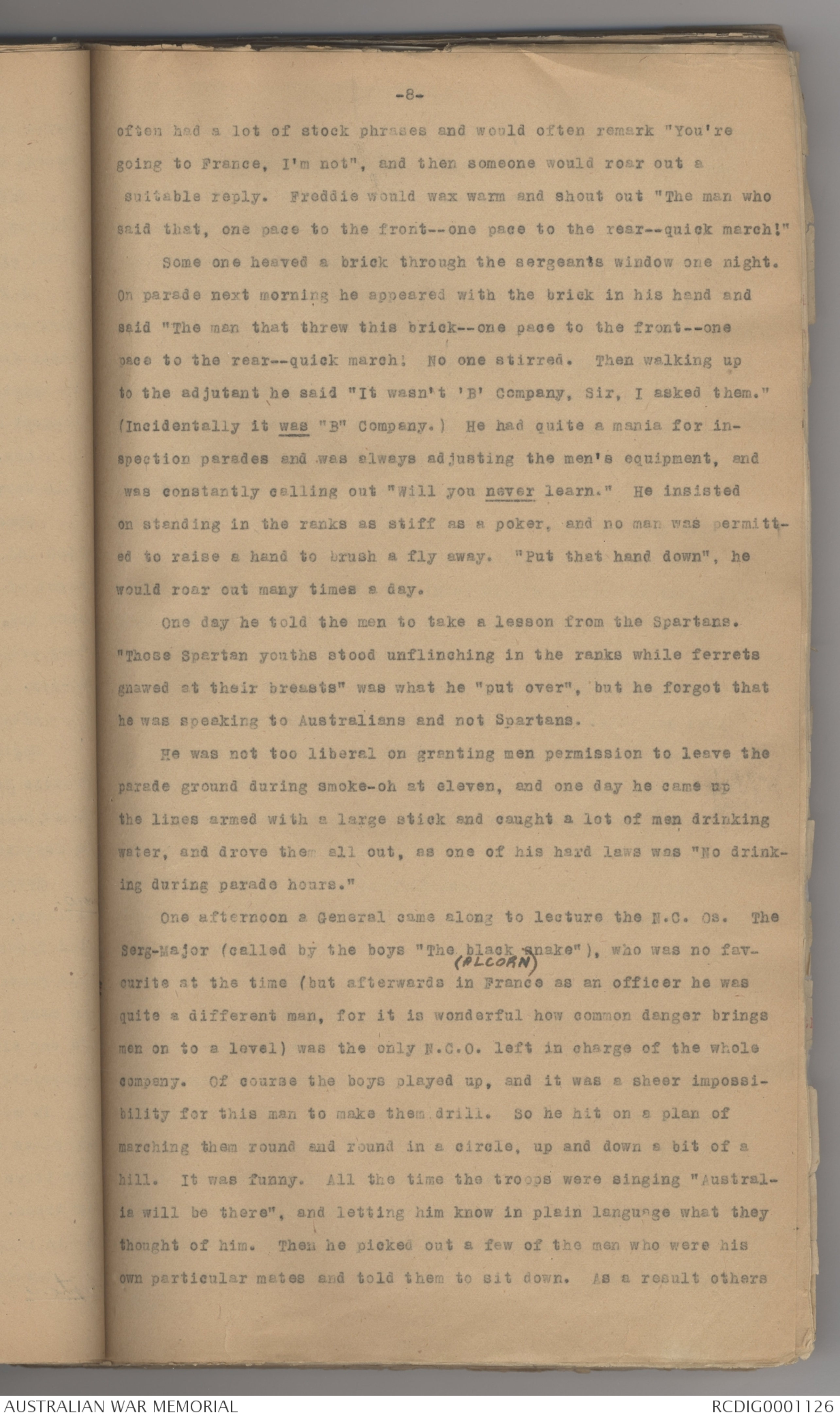
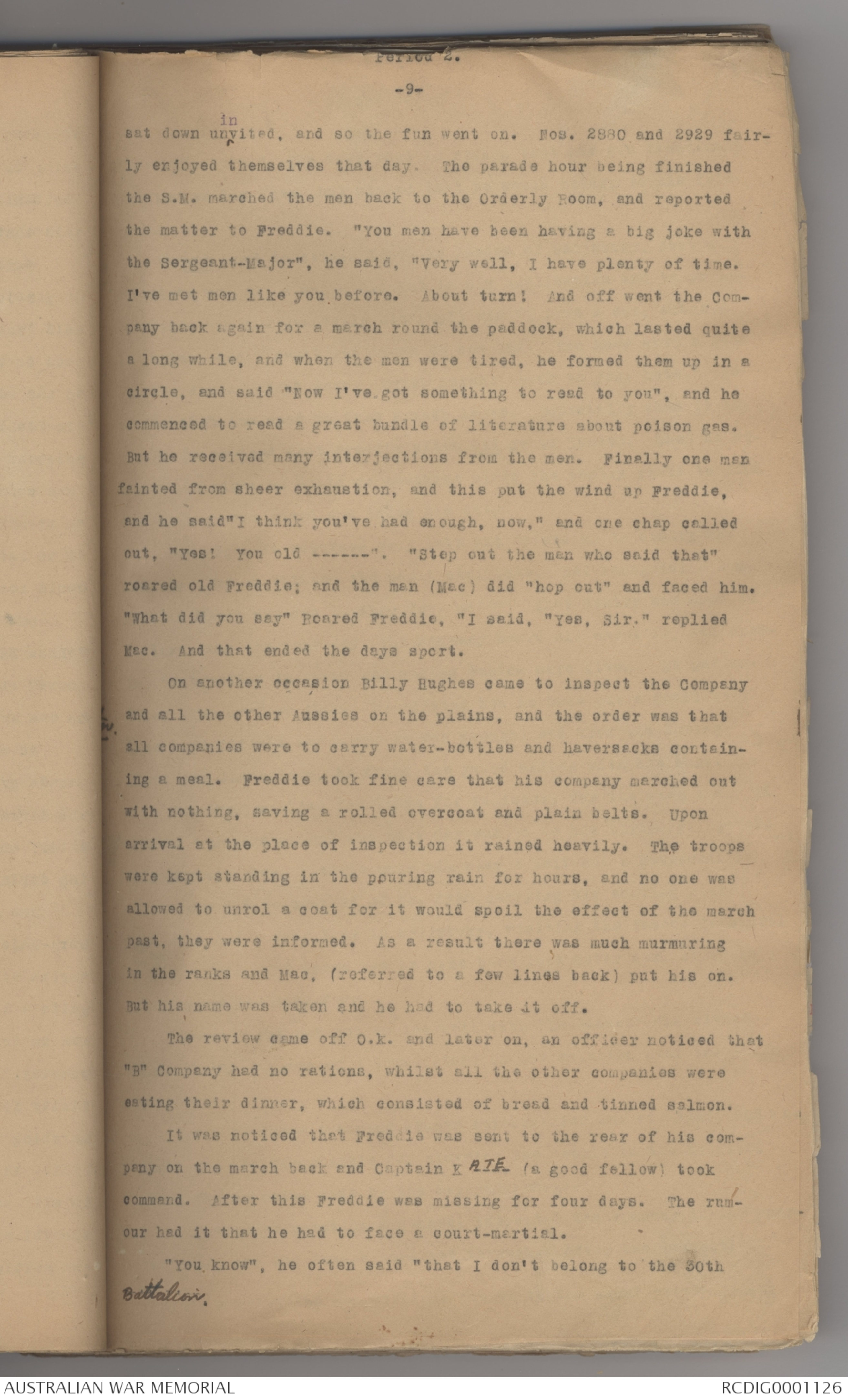
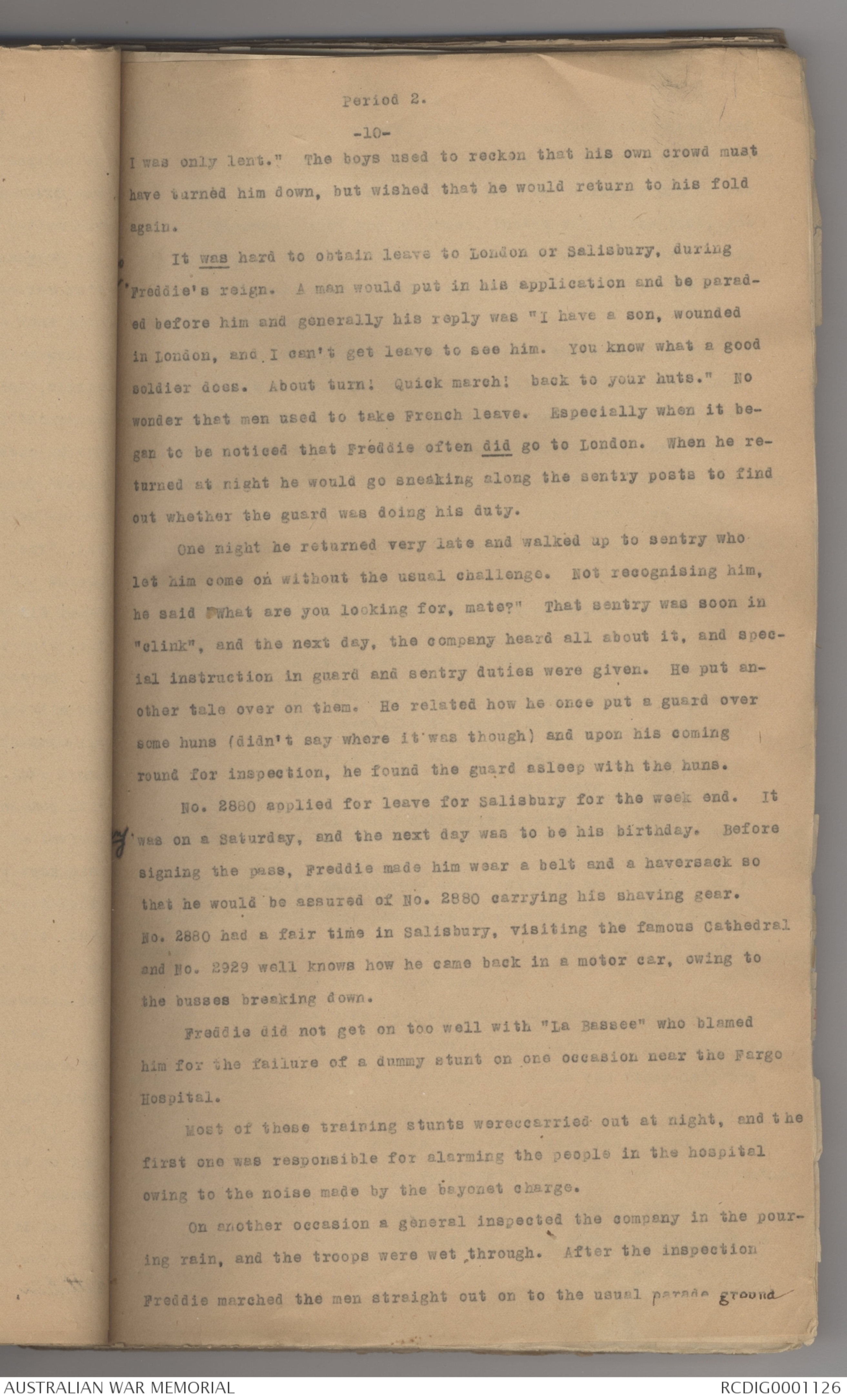
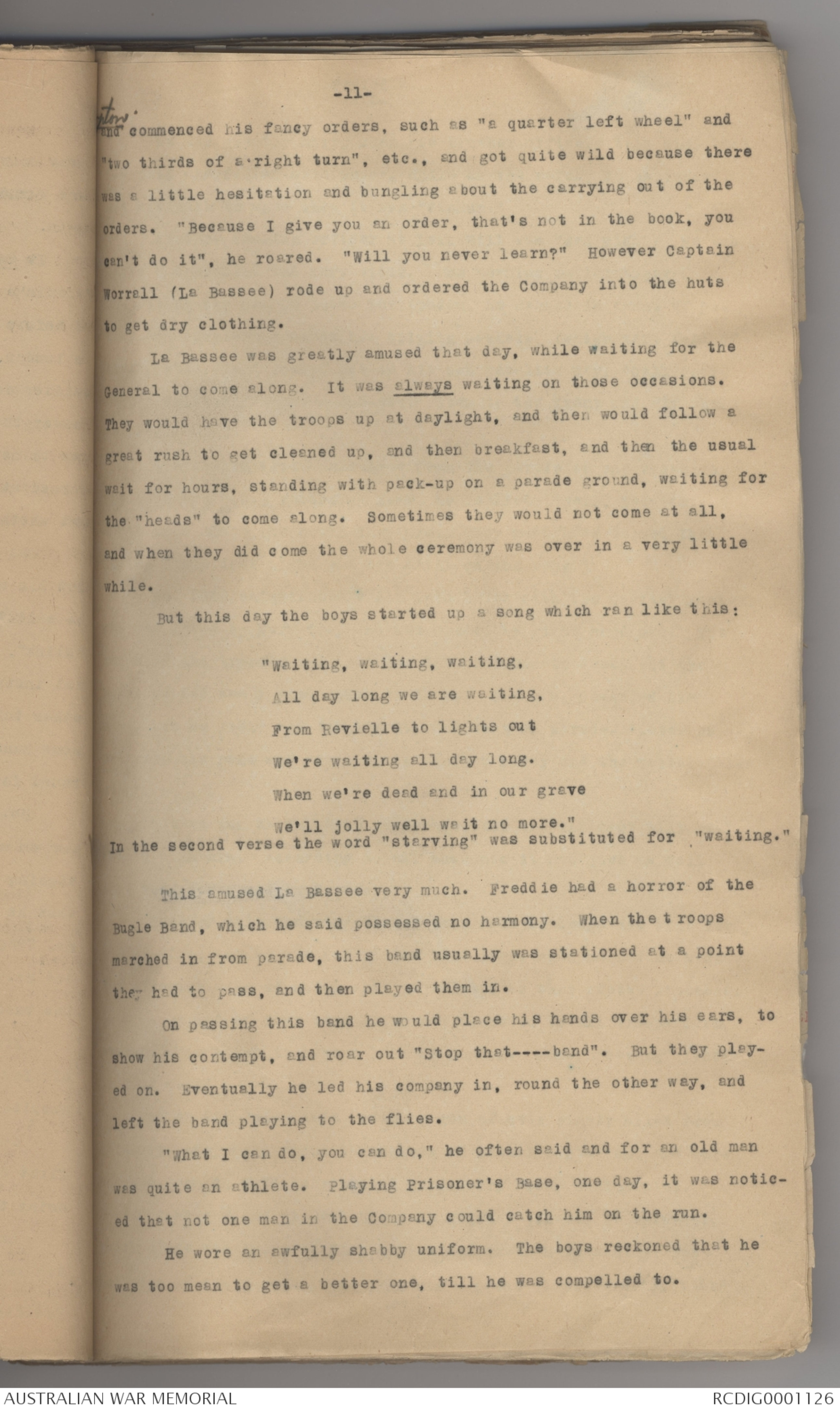
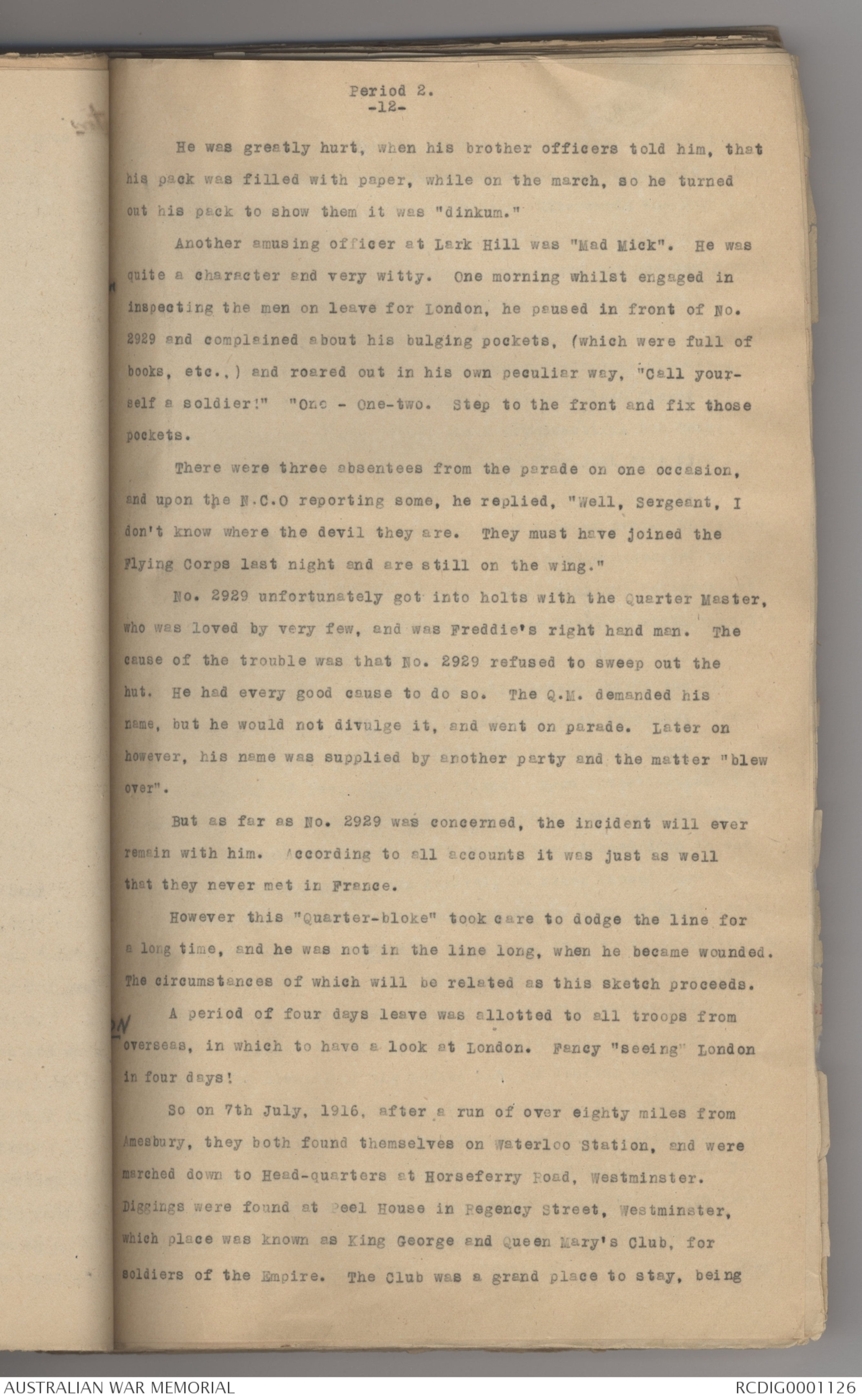
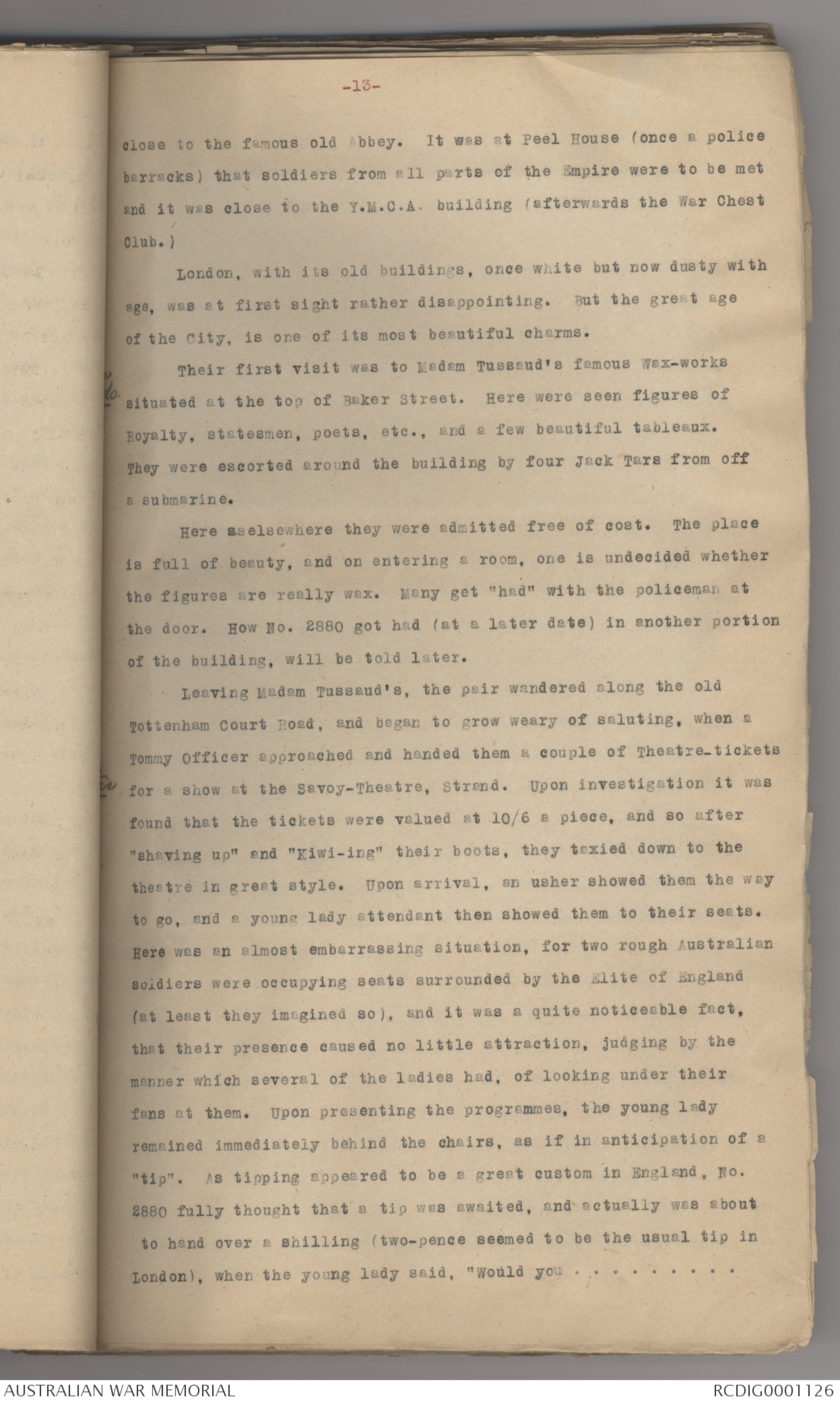
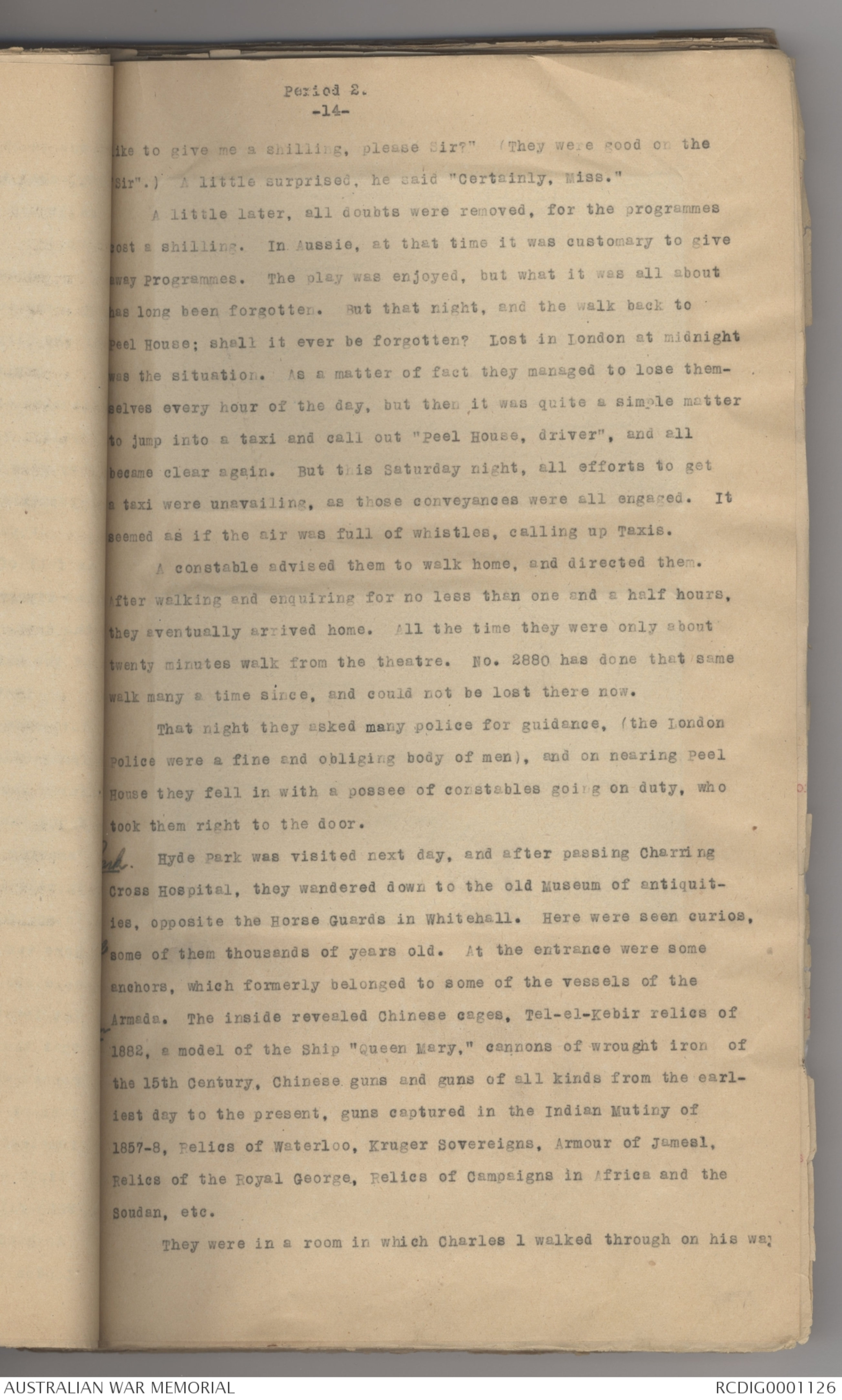
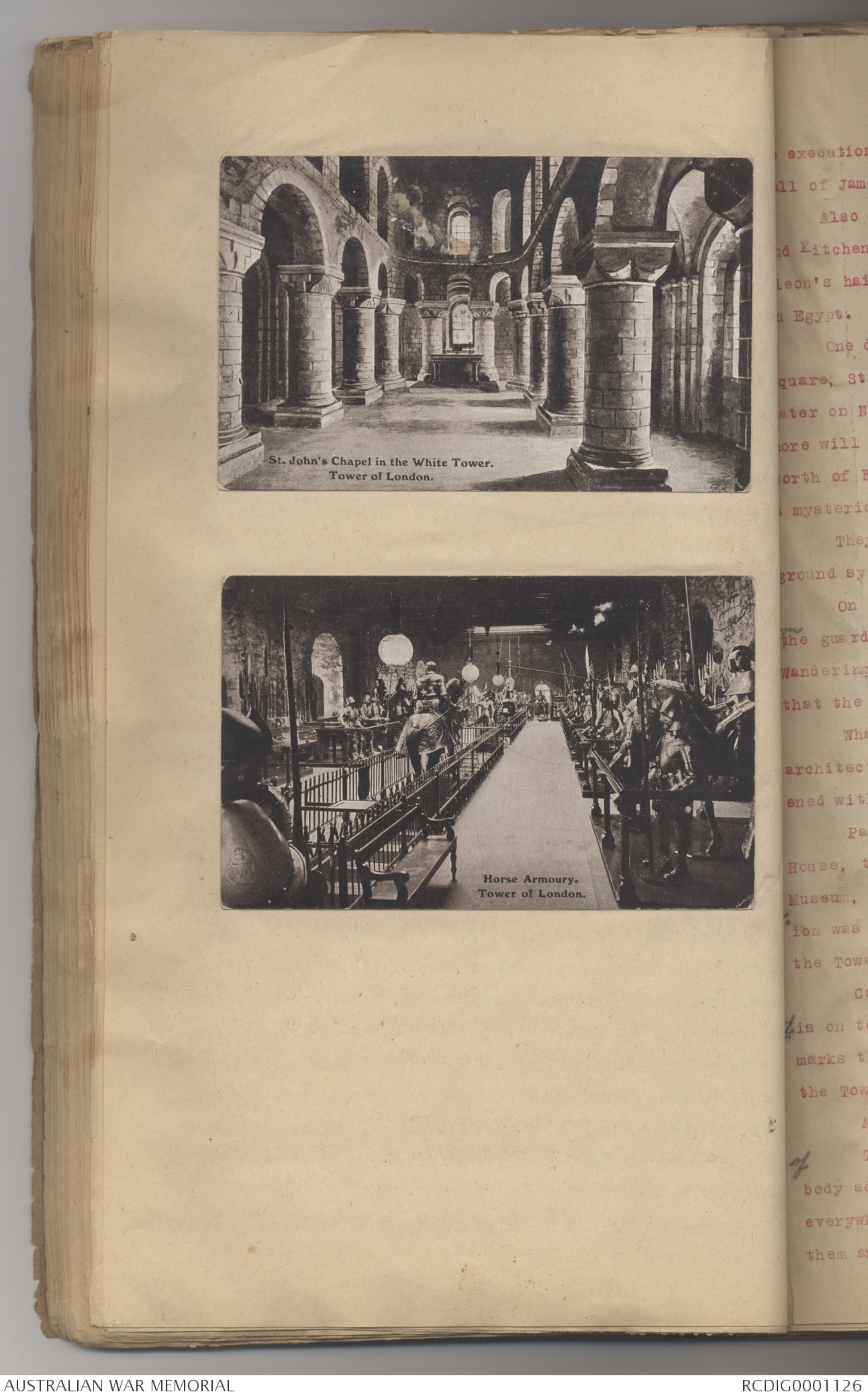
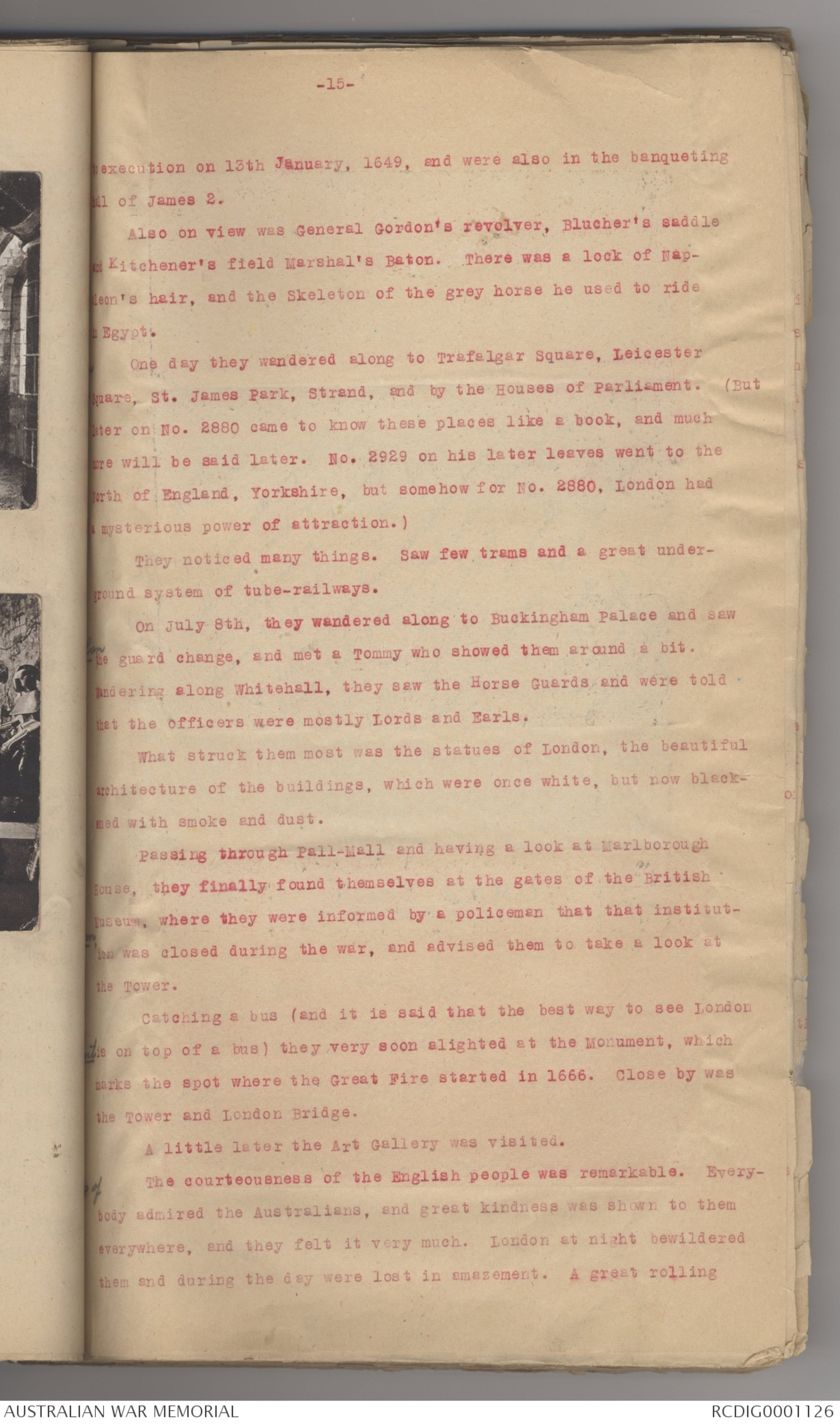
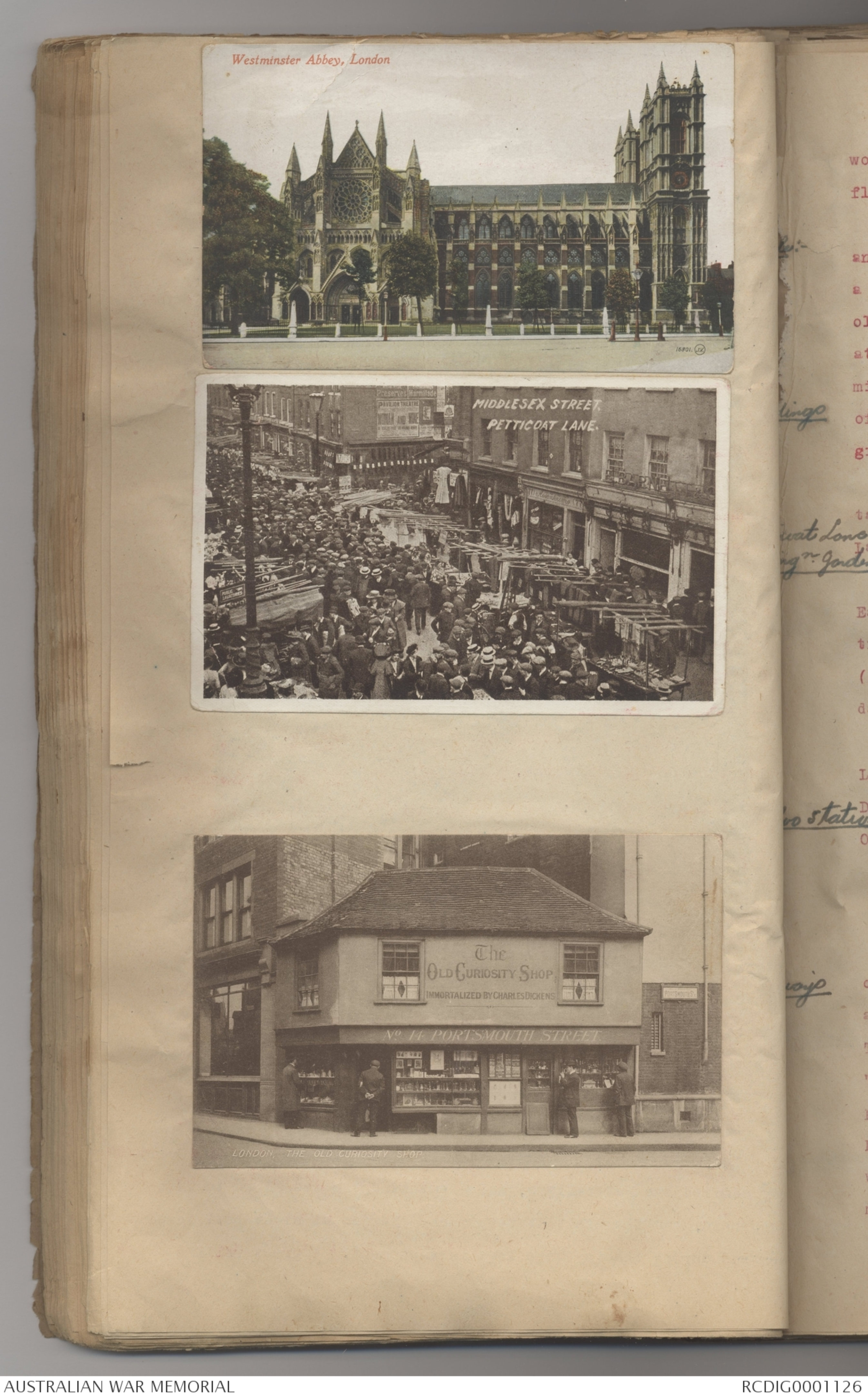
-8-
often had a lot of stock phrases and would often remark "You're
going to France, I'm not", and then someone would roar out a
suitable reply. Freddie would wax warm and shout out "The man who
said that, one pace to the front--one pace to the rear--quick march!"
Some one heaved a brick through the sergeants window one night.
On parade next morning he appeared with the brick in his hand and
said "The man that threw this brick--one pace to the front--one
pace to the rear--quick march! No one stirred. Then walking up
to the adjutant he said "It wasn't 'B' Company, Sir, I asked them."
(Incidentally it was "B" Company.) He had quite a mania for inspection
parades and was always adjusting the men's equipment, and
was constantly calling out "Will you never learn." He insisted
on standing in the ranks as stiff as a poker, and no man was permitted
to raise a hand to brush a fly away. "Put that hand down", he
would roar out many times a day.
One day he told the men to take a lesson from the Spartans.
"Those Spartan youths stood unflinching in the ranks while ferrets
gnawed at their breasts" was what he "put over", but he forgot that
he was speaking to Australians and not Spartans.
He was not too liberal on granting men permission to leave the
parade ground during smoke-oh at eleven, and one day he came up
the lines armed with a large stick and caught a lot of men drinking
water, and drove them all out, as one of his hard laws was "No drinking
during parade hours."
One afternoon a General came along to lecture the N.C.Os. The
Serg-Major (called by the boys "The, black snake"), who was no favourite
at the time (but afterwards in ^(ALCORN) in France as an officer he was
quite a different man, for it is wonderful how common danger brings
men on to a level) was the only N.C.O. left in charge of the whole
company. Of course the boys played up, and it was a sheer impossibility
for this man to make them drill. So he hit on a plan of
marching them round and round in a circle, up and down a bit of a
hill. It was funny. All the time the troops were singing "Australia
will be there", and letting him know in plain language what they
thought of him. Then he picked out a few of the men who were his
own particular mates and told them to sit down. As a result others
PERIOD 2.
-9-
sat down un^invited, and so the fun went on. Nos. 2880 and 2929 fairly
enjoyed themselves that day. The parade hour being finished
the S.M. marched the men back to the Orderly Room, and reported
the matter to Freddie. "You men have been having a big joke with
the Sergeant-Major", he said, "Very well, I have plenty of time.
I've met men like you before. About turn! And off went the Company
back again for a march round the paddock, which lasted quite
a long while, and when the men were tired, he formed them up in a
circle, and said "Now I've got something to read to you", and he
commenced to read a great bundle of literature about poison gas.
But he received many interjections from the men. Finally one man
fainted from sheer exhaustion, and this put the wind up Freddie,
and he said"I think you've had enough, now." and one chap called
out. "Yes! You old -----". "Step out the man who said that
roared old Freddie; and the men (Mac) did "hop out" and faced him.
"What did you say" Roared Freddie, "I said, "Yes, Sir." replied
Mac. And that ended the days sport.
On another occasion Billy Hughes came to inspect the Company
and all the other Aussies on the plains, and the order was that
all companies were to carry water-bottles and haversacks containing
a meal. Freddie took fine care that his company marched out
with nothing, saving a rolled overcoat and plain belts. Upon
arrival at the place of inspection it rained heavily. The troops
were kept standing in the pouring rain for hours, and no one was
allowed to unrol a coat for it would spoil the effect of the march
past, they were informed. As a result there was much murmuring
in the ranks and Mac, (referred to a few lines back) put his on.
But his name was taken and he had to take it off.
The review came off O.k. and later on, an officer noticed that
"B" Company had no rations, whilst all the other companies were
eating their dinner, which consisted of bread and tinned salmon.
It was noticed that Freddie was sent to the rear of his company
on the march back and Captain KATE (a good fellow) took
command. After this Freddie was missing for four days. The rumour
had it that he had to face a court-martial.
"You know", he often said "that I don': belong to the 30th
Battalion.
Period 2.
-10-
was only lent." The boys used to reckon that his own crowd must
have turned him down, but wished that he would return to his fold
again.
1t was hard to obtain leave to London or Salisbury, during
Freddie's reign. A man would put in his application and be paraded
before him and generally his reply was "I have a son, wounded
in London, and I can't get leave to see him. You know what a good
soldier does. About turn! Quick march! back to your huts." No
wonder that men used to take French leave. Especially when it began
to be noticed that Freddie often did go to London. When he returned
at night he would go sneaking along the sentry posts to find
out whether the guard was doing his duty.
One night he returned very late and walked up to sentry who
let him come on without the usual challenge. Not recognising him,
he said "What are you looking for, mate?" That sentry was soon in
"clink", and the next day, the company heard all about it, and special
instruction in guard and sentry duties were given. He put another
tale over on them. He related how he once put a guard over
seme huns (didn't say where it was though) and upon his coming
round for inspection, he found the guard asleep with the huns.
No. 2880 applied for leave for Salisbury for the week end. It
'was on a Saturday, and the next day was to be his birthday. Before
signing the pass, Freddie made him wear a belt and a haversack so
that he would be assured of No. 2880 carrying his shaving gear.
No. 2880 had a fair time in Salisbury, visiting the famous Cathedral
and so. 2929 well knows how he came back in a motor car, owing to
the busses breaking down.
Freddie did not get on too well with "La Bassee" who blamed
him for the failure of a dummy stunt on one occasion near the Fargo
Hospital.
Most of these training stunts wereccarried out at night, and the
first one was responsible for alarming the people in the hospital
owing to the noise made by the bayonet charge.
On another occasion a gèneral inspected the company in the pouring
rain, and the troops were wet through. After the inspection
Freddie marched the men straight out on to the usual parade ground
-11-
commenced his fancy orders, such as "a quarter left wheel" and
two thirds of a "right turn", etc., and got quite wild because there
was a little hesitation and bungling about the carrying out of the
orders. "Because I give you an order, that's not in the book, you
can't do it", he roared. "Will you never learn?" However Captain
Worrall (La Bassee) rode up and ordered the Company into the huts
to get dry clothing.
La Bassee was greatly amused that day, while waiting for the
General to come along. It was always waiting on those occasions.
They would have the troops up at daylight, and then would follow a
great rush to get cleaned up, and then breakfast, and then the usual
wait for hours, standing with pack-up on a parade ground, waiting for
the "heads" to come along. Sometimes they would not come at all,
and when they did come the whole ceremony was over in a very little
wnile.
But this day the boys started up a song which ran like this:
"Waiting, waiting, waiting.
All day long we are waiting,
From Revielle to lights out
We're waiting all day long.
When we're dead and in our grave
We'll jolly well wait no more."
In the second verse the word "starving" was substituted for "waiting."
This amused La Bassee very much. Freddie had a horror of the
Bugle Band, which he said possessed no harmony. When the troops
marched in from parade, this band usually was stationed at a point
they had to pass, and then played them in.
On passing this band he would place his hands over his ears, to
show his contempt, and roar out "Stop that ---- band". But they played
on. Eventually he led his company in, round the other way, and
left the band playing to the flies.
"What I can do, you can do," he often said and for an old man
was quite an athlete. Playing Prisoner's Base, one day, it was noticed
that not one man in the Company could catch him on the run.
He wore an awfully shabby uniform. The boys reckoned that he
was too mean to get a better one, till he was compelled to.
Period 2.
-12-
He was greatly hurt, when his brother officers told him, that
his pack was filled with paper, while on the march, so he turned
out his pack to show them it was "dinkum."
Another amusing officer at Lark Hill was "Mad Mick". He was
quite a character and very witty. One morning whilst engaged in
inspecting the men on leave for London, he paused in front of No.
2929 and complained about his bulging pockets, (which were full of
books, etc.,) and roared out in his own peculiar way, "Call yourself
a soldier!" "One - One-two. Step to the front and fix those
pockets.
There were three absentees from the parade on one occasion,
and upon the N.C.O reporting some, he replied, "Well, Sergeant, I
don't know where the devil they are. They must have joined the
Flying Corps last night and are still on the wing."
No. 2929 unfortunately got into holts with the Quarter Master,
who was loved by very few, and was Freddie's right hand man. The
cause of the trouble was that No. 2929 refused to sweep out the
hut. He had every good cause to do so. The Q.M. demanded his
name, but he would not divulge it, and went on parade. Later on
however, his name was supplied by another party and the matter "blew
over".
But as far as No. 2929 was concerned, the incident will ever
remain with him. According to all accounts it was just as well
that they never met in France.
However this "Quarter-bloke" took care to dodge the line for
a long time, and he was not in the line long, when he became wounded.
The circumstances of which will be related as this sketch proceeds.
A period of four days leave was allotted to all troops from
overseas, in which to have a look at London. Fancy "seeing" London
in four days!
So on 7th July, 1916, after a run of over eighty miles from
Amesbury, they both found themselves on Waterloo Station, and were
marched down to Head-quarters at Horseferry Road, Westminster.
Diggings were found at Peel House in Regency Street, Westminster,
which place was known as King George and Queen Mary's Club, for
soldiers of the Empire. The Club was a grand place to stay, being
-13-
close to the famous old Abbey. It was at Peel House (once a police
barracks) that soldiers from all parts of the Empire were to be met
and it was close to the Y.M.C.A. building (afterwards the War Chest
club.)
London, with its old buildings, once white but now dusty with
ege, was at first sight rather disappointing. But the great age
of the city, is one of its most beautiful charms.
Their first visit was to Madam Tussaud's famous Wax-works
situated at the top of Baker Street. Here were seen figures of
Royalty, statesmen, poets, etc., and a few beautiful tableaux.
They were escorted around the building by four Jack Tars from off
a submarine.
Here aselsewhere they were admitted free of cost. The place
is full of beauty, and on entering a room, one is undecided whether
the figures are really wax. Many get "had" with the policeman at
the door. How No. 2880 got had (at a later date) in another portion
of the building, will be told later.
Leaving Madam Tussaud's, the pair wandered along the old
Tottenham Court Road, and began to grow weary of saluting, when a
Tommy Officer approached and handed them a couple of Theatre-tickets
for a show at the Savoy-Theatre, Strand. Upon investigation it was
found that the tickets were valued at 10/6 a piece, and so after
"shaving up" and "Kiwi-ing" their boots, they taxied down to the
theatre in great style. Upon arrival, an usher showed them the way
to go, and a young lady attendant then showed them to their seats.
Here was an almost embarrassing situation, for two rough Australian
soldiers were occupying seats surrounded by the Elite of England
(at least they imagined so), and it was a quite noticeable fact,
that their presence caused no little attraction, judging by the
manner which several of the ladies had, of looking under their
fans at them. Upon presenting the programmes, the young lady
remained immediately behind the chairs, as if in anticipation of a
"tip". As tipping appeared to be a great custom in England. No.
2880 fully thought that a tip was awaited, and actually was about
to hand over a shilling (two-pence seemed to be the usual tip in
London), when the young lady said, "Would you....
Period 2.
-14-
like to give me a shilling, please Sir?" (They were good on the
Sir.) A little surprised, he said "Certainly, Miss."
A little later, all doubts were removed, for the programmes
cost a shilling. In Aussie, at that time it was customary to give
away Programmes. The play was enjoyed, but what it was all about
has long been forgotten. But that night, and the walk back to
Peel House; shall it ever be forgotten? Lost in London at midnight
was the situation. As a matter of fact they managed to lose themselves
every hour of the day, but then it was quite a simple matter
to jump into a taxi and call out "Peel House, driver", and all
became clear again. But this Saturday night, all efforts to get
a taxi were unavailing, as those conveyances were all engaged. It
seemed as if the air was full of whistles, calling up Taxis.
A constable advised them to walk home, and directed them.
After walking and enquiring for no less than one and a half hours,
they eventually arrived home. All the time they were only about
twenty minutes walk from the theatre. No. 2880 has done that same
walk many a time since, and could not be lost there now.
That night they asked many police for guidance, (the London
Police were a fine and obliging body of men), and on nearing Peel
House they fell in with a possee of constables going on duty, who
sook them right to the door.
Hyde park was visited next day, and after passing Charring
Cross Hospital, they wandered down to the old Museum of antiquities,
opposite the Horse Guards in Whitehall. Here were seen curios,
some of them thousands of years old. At the entrance were some
anchors, which formerly belonged to some of the vessels of the
Armada. The inside revealed Chinese cages, Tel-el-Kebir relics of
1882, a model of the Ship "Queen Mary," cannons of wrought iron of
the 15th Century, Chinese guns and guns of all kinds from the earliest
day to the present, guns captured in the Indian Mutiny of
1857-8, Relics of Waterloo, Kruger Sovereigns, Armour of Jameal,
Relics of the Royal George, Relics of Campaigns in Africa and the
Soudan, etc.
They were in a room in which Charles 1 walked through on his way
Black and white postcards, see original document
St John's Chapel in White Tower,
Tower of London and
Horse Armoury.
Tower of London
-15-
to execution on 15th January, 1649, and were also in the banqueting
hall of James 2.
Also on view was General Gordon's revolver, Blucher's saddle
and Kitchener's field Marshal's Baton. There was a lock of Napolean's
hair, and the Skeleton of the grey horse he used to ride
to Egypt.
One day they wandered along to Trafalgar Square, Leicester
Square, St. James Park, Strand, and by the Houses of Parliament. (But
later on No. 2880 came to know these places like a book, and much
more will be said later. No. 2929 on his later leaves went to the
North of England, Yorkshire, but somehow for No. 2880, London had
a mysterious power of attraction.)
They noticed many things. Saw few trams and a great underground
system of tube-railways.
On July 8th, they wandered along to Buckingham Palace and saw
the guard change, and met a Tommy who showed them around a bit.
Wandering along Whitehall, they saw the Horse Guards and were told
that the officers were mostly Lords and Earls,
What struck them most was the statues of London, the beautiful
architecture of the buildings, which were once white, but now blackened
with smoke and dust.
Passing through Pall-Mall and having a look at Marlborough
House, they finally found themselves at the gates of the British
Museum, where they were informed by a policeman that that institution
was closed during the war, and advised them to take a look at
Tower.
Catching a bus (and it is said that the best way to see London
is on top of a bus) they very soon alighted at the Monument, which
marks the spot where the Great Fire started in 1666. Close by was
the Tower and London Bridge.
A little later the Art Gallery was visited.
The courteousness of the English people was remarkable. Everybody
admired the Australians, and great kindness was shown to them
everywhere, and they felt it very much. London at night bewildered
them and during the day were lost in amazement. A great rolling
3 photos - see original document
 Transcriber 30666
Transcriber 30666This transcription item is now locked to you for editing. To release the lock either Save your changes or Cancel.
This lock will be automatically released after 60 minutes of inactivity.